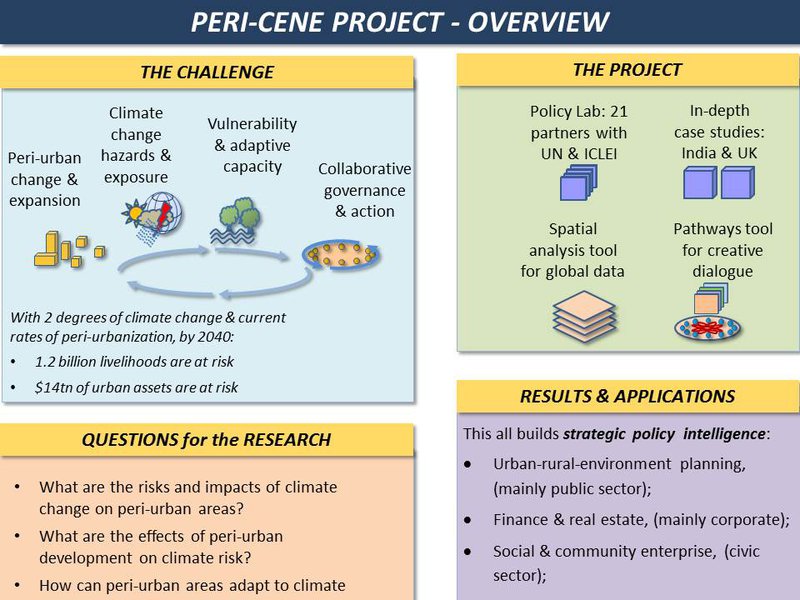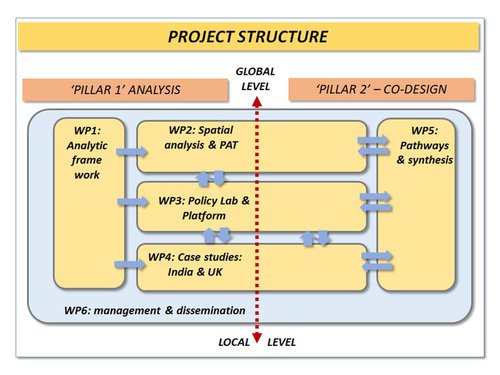
The Project
From space, the human impact on the planet can be seen most clearly through the spread of cities. However, cities themselves are spreading into much larger sprawling areas around and between them. The planet has arguably entered the 'Peri-cene' – a new global human-environment system shaped by peri-urbanisation.
Around the world, peri-urban areas contain global hubs and local enclaves, sprawl and disorder, and crucial urban infrastructure. Peri-urbanisation leads to the the disruption of communities and livelihoods and, in particular, there is growing ecological disruption and climate risk.
Peri-urban areas, too often overlooked by policymakers and academics, are also crucial to the urban food-water-energy nexus and three United Nations UN Sustainable Development Goals (SDGs):
- (11) Sustainable Cities and Communities;
- (13) Climate Action; and
- (15) Life on Land.
Yet the peri-urban is not simple to identify and define, which means that the interactions between peri-urbanisation and climate risk have been little studied; until now.

Photo by Michael Held on Unsplash
Between 2019 and 2021, the Peri-cene project is conducting a pilot assessment of global peri-urbanisation with its climate risks, vulnerabilities, capacities, and adaptive pathways. Such work will help policymakers to work towards the realisation of the UN SDGs. Outputs include:
- a global typology and global assessment with an interactive Peri-urban Analysis Tool;
- new synergies and pathways to address the policy challenges in a ‘Policy Lab’ with 24 city-regions from around the world and includes UN Habitat, UN Global Compact on Cities, and ICLEI;
- in-depth case studies in Chennai, India and Manchester, UK; and,
- the co-creation of adaptive governance pathways to mobilise collective policy intelligence to address peri-urbanisation and climate risk at local, regional and international scales.
Overall, Peri-cene is an agenda-setting project, in theory and practice, that builds on major EU projects, global data resources, and on existing clusters of expertise in Chennai, Manchester and Stockholm.
Identified themes and challenges, as well as the Peri-cene project work plan, can be seen in the image below.

Project outline
Aims and objectives
The overall aim:
explore the interactions between peri-urbanization and climate-environmental change, at local and global levels: and to co-design adaptive pathways towards peri-urban climate resilience.
Specific objectives
- Develop a typology and global assessment which covers all main development types and urban-climate-environment types.
- Outline the typical peri-urban impacts / effects on climate-environment change, in their context of urban and regional inter-dependencies.
- Outline the typical climate-environment impacts / effects on peri-urban areas, in the context of risk, vulnerability and resilience.
- Explore the deeper layers of peri-urban / climate-environment interactions via in-depth case studies.
- Explore possible solutions in the form of adaptive pathways and strategic policy intelligence, by stakeholder dialogue and co-design in a Living Lab context.
Approaches and methods
- Spatial analysis
- Global comparative study via the peri-cene framework
- Grounded case studies
- Policy & governance analysis
- Synergistic methods for pathway mapping & design
Expected results and impacts
- a global typology and global assessment with an interactive Peri-urban Analysis Tool;
- new synergies and pathways to address the policy challenges in a global ‘Policy Lab’
- in-depth case studies in Chennai, India and Manchester, UK; and,
- adaptive pathways to mobilise collective climate intelligence to address peri-urbanisation and climate risk at local, regional and international scales.
Partner cities / regions
Main Case studies
- Chennai, India:
- Manchester region, UK:
City-regions in the Policy Lab
- Bangkok,
- Belo Horizonte,
- Cairo,
- Changsha,
- Dhaka,
- Doha,
- Granada,
- Guangzhou,
- Helsinki,
- Johannesburg,
- Kumasi,
- Melbourne,
- Mexicali
- Naples,
- San Diego,
- Santiago
- Stockholm
- Surabaya,
- Tokyo,
- Toronto,
International partners:
UN Habitat, UN Global Compact on Cities, and ICLEI
Project key facts
- Duration – 2019-2021
- Budget - £696,000 between 3 partners
- Partners – KTH Royal Institute of Technology Stockholm: Indian Institute of Technology Madras
Project structure
Peri-cene is organised as a multi-level partnership. The project links a global assessment with local case studies. This is done across two ‘pillars’ where Pillar 1 provides analysis and Pillar 2 provides ‘co-design’ activities.
- Work Package (WP) 1 – Analytic Framework;
- WP2 - Geospatial Analysis (global assessment & interactive tool on peri-urbanisation and climate risk)
- WP3 – Policy Lab (a research-policy community representing 18 city-regions around the world)
- WP4 - Case Studies in India and the UK (in-depth analysis of the Chennai region (India), and the wider Manchester City-Region (UK), using findings from WP1, WP2, WP3)
- WP5 – Pathways and synthesis (a structured co-design process for co-design scalable and transferable solutions).
- WP6 – management & dissemination
.

.
